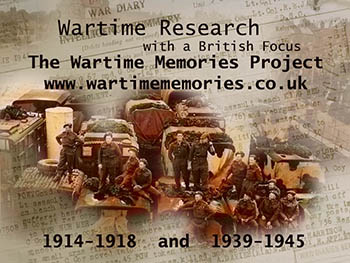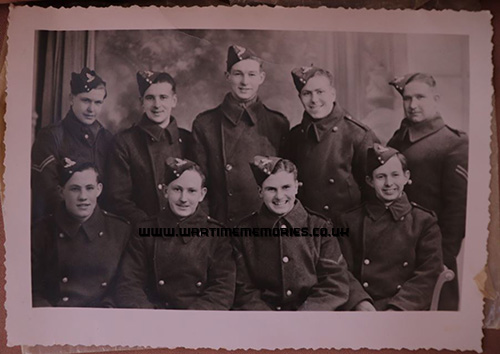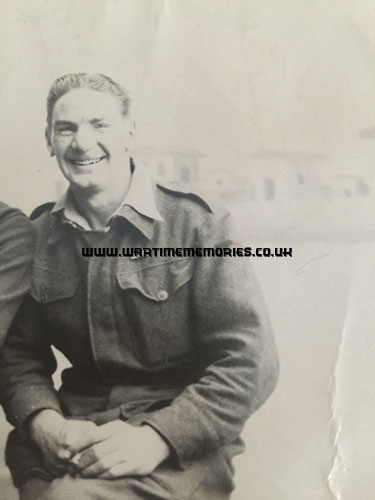World War II Experiences of George Cuthbert of Cathcart, Glasgow.
By Ian Andrew Lindsay, Great Nephew, for a Lenzie Academy school project.
This is a story about my Uncle George Cuthbert's War-time experiences and one of his friends, Harry Osborne, who he met before World War Two. He gave a speech to a Regiment Reunion in 1982, summarising his experiences, which was tape recorded and forms most of the story.
Harry Osborne, helped in deciphering and explaining the tape contents. He and my Uncle George joined the Territorial Army in March 1939, on the same night. Harry was just 19 years old and my Uncle was 23 years old.
Going to War: Great Uncle George's comments from tape.
"My friend over there said we are not just a unit but a family, and that family starts back In 1939 in the regiment before the war, we went to camp, Budden Ness, near Canoustie, and all of you were young soldiers but I wasn't I was in the original battery (group of guns) because I was a surveyor. (Someone who surveyed the land to see what the guns where aiming at) Then in September 1939, we all got our bits of paper through the door (call-up papers) and I went scampering round to the Drill Hall at Cathcart (Glasgow) and the Sergeant Major Officer said "Go away!" He was up to here in paper. "Go away we will send for you." So they did they sent for me the next day.
And then what happened:- I had a tearful farewell and went off to War, and I had my own pack because they had not given me a pack, my own pack on my back, and off I went to War, mother said "Good-bye" and away I went.
I was back for lunch, they sent me back, they didn't want me! Mother said "What is happening? " I said "I don't know" "But what did they tell you ?" "They did not tell me anything" and "What have you to do?", I said "I have to go back at 2 o'clock". So I went back at 2 o'clock and then they said "Go back home and come back tomorrow", and I went back home and my mother said "What are you doing back ?
I thought you were going to War." I said "I am back and I don't know why. I don't think they are sending us anywhere." and that went on, for how long did it go on for, every day for a month!
And what did we do in between times we went on route marches, do you remember .... We were marching along to 'Roll out the Barrel', (a popular song of the time) and can anyone ever imagine marching to 'Chattanooga Choo Choo' but we did it! And now and again, when we passed some poor inoffensive civilian somebody in the ranks would call out "Aye you'll go" (meaning you will be next to be called-up) and some one else would shout "and twopence halfpenny will not get you back!" (that was the maximum tram fare to the outskirts of Glasgow) Well that was fine, now most of us were very young, at that time, but they finally took us off down to Crookham Crossroads, down to Leipzig Barracks (called that because the Kaiser opened it in 1913).
And they kept giving us money, money came out of the heavens! You got coat money, you got boot money, you even got bounty money for camp you had been at In the summer! I don't know for the rest of you, but for me this was the kind of money I had never seen in my life before I mean, £5 in one lump, nobody ever saw £5 in 1938. Not if you had just left school you didn't! Anyway that is what went on; and then Oh! English beer, do you remember ... that English beer! Somebody said that it was cats piss watered down!
France – Dunkirk
Right, of course, then we went off to War.
We went off to that lovely French Resort, Les Trois Pierre, near Bolbeck l20 miles from Le Harve). Do you remember ... Les Trois Pierre?
Right, there we were and then we finally moved up to the War, we travelled across France, only it was rather difficult at the time, because the elements (weather) were doing their best to stop us. We only got halfway and we got snowed up, and we were stuck there for, I think, about a week, and Andy Gump (Anderson) swore he was going to write a book, when he got back, about how he was towed across France, because we towed him the whole way from Les Trois Pierre to Roubaix, he was towed the whole way that ...
And I think, I think, Tom Wright remembered that ...
So to Roubaix, someone mentioned Roubaix already, the time we had there, it was really something! Ah, I think we all enjoyed ourselves there, I know my French improved remarkably, but that was fine, ok, we went into battle, we came out again, and then Harry and I were remembering these days when I was by myself, I had lost the whole regiment.
[Recalled from previous conversations]
George got separated from the rest of the regiment, stole a motorbike, drove to Dunkirk, had obtained some waders and got on a rowing boat. But the boat, being full, got stuck in the sand. George jumped out to push it off, his waders filled up and he was nearly left behind, but someone pulled him into the boat.
He boarded a puffer (small fishing boat), which then off loaded them onto a Destroyer, which got torpedoed by a German Sub, it did not sink, and a Cross channel ferry then came alongside and rescued them. They return to Southern England.
Back to the tape:-
I was rescued by a fishing vessel, soaked up to the neck, and I got down into the pitch black hold and asked "Is there any room to lie down here?" I said and a voice said "Is that you George?" It was Harry Osborne, I was standing at his feet! And he gave me a towel and I got myself dried. I had a tin of sardines and Harry a tin of condensed milk. Together they made a great meal!
Right, then of course, we gathered at Charmouth near Lyme Regis (town in the south coast of England). We all finally got back, one by one, we trickled in from all over Britain. When I got back, I didn't own a razor, I had one spare shirt, and I came on parade, I came on parade and Captain Walker, I had been his observation post assistant, and he came down as I was standing on parade and he said "Cuthbert your Boots are Dirty!" Your boots were dirty! Well, I said "The last time I cleaned them was in France." There you are that’s the Army!
Harry Osbourne's story:
Harry and Uncle George were part of the British Expeditionary Force (BEF) part of the first Army.
Harry talked about how at the front, before the retreat, all the 'Officers' seemed to disappear on courses, even most of the Sergeant Majors disappeared, leaving the troops to fend for themselves. Harry and Uncle George had to blow up their 4.5 inch Howitzer, as that is the gun they used in 1940.
The troops retreated 18 miles to Dunkirk, where the town was being bombed, a Brigadier formed them into groups of about 50 men, then told them to go to the beach, find a rowing boat, which had an anchor into the sand with a rope to a puffer (small fishing boat) so that they could haul themselves to the boat, quicker than rowing.
Dunkirk - details from the Library book, World War Two by Ken Hills:
Nine days of continuous calm is a rare event in the English Channel but it happened, allowing small boats accompanied by the Royal Navy to go to the Dunkirk beaches, to bring home the British troops trapped there, as Uncle George said "The boat was full and got stuck in the sand"
Back to the tape:
Right, now of course we get to the place where we really soldiered, in Sway, (near Bournemouth) that is where the 77th Highland Field regiment and 306 Battery, I think, in particular really made their mark, in Sway. I think we enjoyed our 21 months, I think we were pleased at our performance, that, it was a really good time. But then they finally uprooted us, most unwillingly, and dragged us up to Scotland.
But don't forget we had to fight our way back to Scotland (from Sway, by doing training exercises), we marched over the moors from Catterick (Northern England) to Barnard Castle and then had to fight our way back to Scotland, they would not let us in, but we got there.
North African Campaign
Then eventually we left for overseas and we were on that lovely cruise Ship the 'Johan van Oldenbarnwelten'. It must have cost the a fortune to put that in brass letters around the counter. Really! We got out to North Africa and that is where there was a very important ceremony, there was a very important place in North Africa, a very sad burial.
We buried about 3 x 5 gallon drums of 'Green Blanko' (stuff to clean and dye their belts and gaiters green, not required for brown Africa), not far from Algiers and not far from Mers on Blanche that we buried this 'Blanko' for the rest of the War. And then, we were then as you might say 'blooded', I think in my recollect1on the war in Belgium had been too quick, to sudden, and we didn't know enough.
I think when we went to North Africa we were very busy much more seasoned soldiers, we knew what we were doing we really got on very well there.
Harry Osborne's story: In the First Army in Africa we used 25 pounder guns, the latest gun of its time, a magnificent quick firing and very good for knocking out tanks due to its high muzzle velocity.
From the Library book: The War in the African desert moved back and forth for two years along the north African coast.
Back to the tape: I have just seen today a very good map by J V McKay of the North African Campaign with the 77th Highland Field Regiment route through North Africa, and he has on it that at the end of the campaign; at a place called Corba, just south of Nems al Tamire, Cape Bon that Sergeant Skipsey's gun fired the last rounds of the North African Campaign. And I can tell him how many rounds that was! It was 9 rounds, that were fired at little boats that were taking off for Pantillaria Island and that was Colonel Pike, was it not you, that ordered, Sergeant Skipsey to bring these boats back he said, and Sergeant Skipsey’s gun was only about 20 yards from the beach and he swung the gun round, which was No 1 gun of 'Don' troop and he fired 9 rounds and later on in the Command Post we got this piece of paper all tabulated off, the various kinds of ammunition and under the heading 25 pounder and down the side it had the dates and when it came to the last date there had been a few days with no ammunition fired at all, and on this date there was 9 rounds of 25 pounder ammunition fired. that was 'Don' troop 306 Battery 77th Highland Field Regiment had fired the last 9 x 25 pounder rounds in the North Africa Campaign.
Well, that was it, we then, Ah, then the buzz went round, we got on the docks at Tunis, the Ship was standing there, we were going home. Somebody said "There is mail in that ship for Blighty (army term for home) we are going home !" Right, what did we find the next morning, the ship had sailed, where was the morning sun ? Right on the bow of the ship ! There we were going east, we are going to Burma, and down we went through Suez, Port Said, we are stopping here, 'no' we are not, right through non-stop straight through into the canal, Burma it is, get our chopsticks ready, and then what happened.
We got to Bitter Lakes, dropped anchor and that was New Year's night, and 1 can't remember who it was, I think it was Mr Kennedy who came down to where I was with a bottle of whisky, he says right, we are going ashore, this is as far as we are going, Happy New Year and I got a tot of whisky. I was lucky, the privilege of being a Sergeant..
Then we had a little trip from Egypt to Naples (Italy).
On the trip we started off lying in the sun in the boat travelling up the Suez Canal, then the battledress blouses went on, and then the greatcoats went on, and then the balaclava helmets, and then when we stepped ashore in 'Sunny Italy' there was 9 inches of snow in Naples.
Italy
We sat on the dockside, If you remember, for about 5 hours, we sat in a neat little backstreet and then somebody had the bright idea to march us up to where the transport was, but the transport was just on the other side of the road and IT was moving up to, so we marched for about 1/4 of a m1le carrying all our full serving marching order, our kitbag and our blankets. We marched up until somebody said "Right, get on to that truck". The same truck that had come up the road with us, but we got on and away.
Well, that was Naples in the snow.
Then, Ah. Tommy guns were issued to everyone, to fight their way ashore and I don't think any of these Infantry Companies from the 77th Highland Field Regiment went off in very great heart at all, because that was not our kind of war. We were the long range fighters, we didn't fancy this idea of going ashore. Mind you, it didn’t worry me because I was in the rear party. I was alright.
We finally fought our way up to Cassino and what I remember about Cassino is my arm getting about 3 or 4 inches longer, carrying ammunition up the hill, from the bottom to the top. Because we were 'smoking' Cassino from dawn to dusk, 1 round of smoke every 2 minutes. A terrible lot of smoke, a lot of ammunition to be brought up from the bottom to the top. Everybody was carrying it Officers, NCO's everybody.
From the Library book:
Allied bombers smashed the ancient Abbey of Monte Cassino and turned it into a smok1ng ruin. But it took the Allies two more months of bitter fight1ng to drive the Germans out.
Harry Osbourne's story:
We kept sending smoke bombs over the river below Cassino, so that it formed a fog, so the army could build bridges across the large river, which needed to be crossed.
Back to the tape:
Anyway, we got to Greece, and I think we had our happiest time of the whole war. In Greece, we even had set up a Further Education College, where everybody was scampering to learn elementary French and Architecture and all sorts of things and, so far as I was concerned is where the shutters came down. I was always very disappointed that we left Cathcart, Oh, by the way, I shouldn't be here! I should still be standing at the 'Cooper Institute' because Taffy Mills, when we were in the Cooper Institute, he said "Cuthbert", we were standing there with our blankets, with a bit of string, to tie it round us, and we got a tin of 'bully beef' between two and a packet of biscuits and he said "Cuthbert, go out to the door relieve so and so and let him come in to get his blanket".
So I went to the door of the hall, to keep out all the wives, sweethearts and girlfriends, you see. Next thing that happened was the battery marched out of the Cooper Institute and left me standing on guard at the door! Now as a good soldier, I should really should still be standing at the Cooper Institute door because nobody relieved me and the. last order was "Cuthbert go and guard that door" and I should still be there!
But, I mean, I took a chance, and came with the Battery and that’s how I happened to be here.
So, now, I don't want to keep you too long, I've talked long enough, and I feel that to me, that has been the Regiment, that has been a part or my life that I would never have missed, to have got to know you all, to have lived with you, Oh to have cursed and sworn with you, to have seen some of you far enough, that man for example, but still in all, It was a great time and we were a pretty good bunch. Thank you.
End of the tape.









